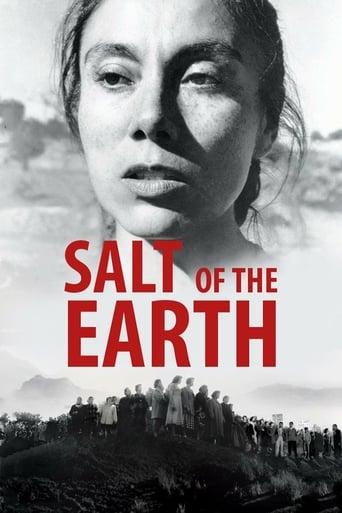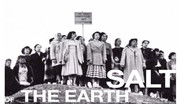madre2
As a U.S.-born Latina whose family has lived in the northern New Mexico/southern Colorado region since the early 1700s, I'm ashamed to say I had never heard of this film. I was trolling through Netflix for something to watch one night when this popped up in my "suggested films" list. Boy, am I ever glad I watched it.My grandfather was a coal miner in southern Colorado, and the coal-mining industry (and its effects on Hispanos of the Southwest) has been an interest of mine all of my life. Quite simply, this film brought history to life for me. The actors, location, themes, language, and other details were so authentic, that I felt I was watching a documentary at times. I felt a spiritual connection to my grandparents, who lived and worked in coal mining camps in the early part of the 20th century. I grew up hearing their stories, and the devastation of the Colorado Coalfield Wars and the Ludlow Massacre.This is, quite simply, a stunning cinematic achievement, especially given that it was written and filmed in 1954. Sadly, many of the prejudices and themes in the film resonate today. Little has changed for many of the hardworking Hispanos who have called the Southwest home for centuries.
gaijin88
My interest in this movie was due to the negative reaction that it received when it was first released. In the interest of full disclosure, I am not in favor of compulsory union membership. I strongly believe that union membership should be entirely voluntary, and members should be able to keep the union from using their dues for political causes that the members do not support. That being said, I found this movie very entertaining and inspiring. These were people whose entire lives were dependent on the mine and their ability to earn a decent wage. They were totally invested in the union and had to live with the consequences, good or bad, of their actions. The women were as invested in the mine and the union as were their husbands, even though they were not actually employed by the mine or members of the union. The actions of these women were truly inspiring. But I did notice three areas which I think make the union portrayed in this movie completely different from today's unions: 1. The union leaders put up with the same hardships as the rank and file. Their jobs were on the line and they also suffered from not being paid, and were just as dependent on the donations from others outside of their union. 2. The union members (and eventually the wives as well) were free to vote their consciences with respect to all actions proposed by the union. There did not appear to be anyone who was trying to bully or unduly influence the other members to vote a particular way. 3. There were no politicians (local or from Washington) involved in the strike. There were no congressional hearings or big union bosses trying to influence the strike. Other than the donations of food and other necessities from other sympathetic unions, the mine workers were on their own.
cstotlar-1
The film itself is a "cause celebre" Just imagine ... a movie blacklisted by a fascist government, made by wrongly convicted geniuses, am overt reference to world Communism...what's not to love? Frankly, I'm not aware of any outstanding works by any of the collaborators. Their works ranged from "adequate" to "mediocre" or even worse. If it had anything to say at the time, it seems quite commonplace today. The test of any true work of art is the test of time and this one has aged quite badly.It is an historical comment, nothing more, and actually it's rather boring and irrelevant to today's audience.Curtis Stotlar
bill-790
The vast majority of fans who have commented on "Salt of the Earth" have given the film a high rating and unusually enthusiastic plaudits. I'm going to go out on a limb and offer a quite different view. The reason for my iconoclasm is easy to explain."Salt of the Earth" is, simply, a very bad movie.One cannot deny that the issues raised in the film are worthy of cinematic treatment. However, in this case the good guys and the bad guys are hopeless caricatures. I'm somewhat surprised that the evil landowners are not wearing stovepipe black hats while twisting long, waxed moustaches in their fat fingers as they mock the poor but righteous workers. Come on! This is cartoon stuff.It is not unusual in politics for each side to spread totally false and slanderous visions of their opponents. But that's just the trouble with "Salt of the Earth. ' It's political propaganda, not honest cinema. Ultimately, by portraying one side as good, fine, and noble, and the other as the essence of evil, one fails to convince. It's not a good strategy to insult the intelligence of the viewer. That, unfortunately, is just what this film does, no matter how well intentioned it may have been.The makers of this film were struggling against the foolish Hollywood Blacklist. One can understand their bitterness and anger. It's too bad, however, that they could not have fashioned a less stereotyped script, one that portrayed all characters as real people and not stock props out of the left-wing playbook. But, one must also remember that there were plenty on the left in those days who were still apologizing for the Stalinist regime. Perhaps I am expecting too much from people caught up in the bitter political battle of those days. Certainly Hollywood turned out its share of films that stereotyped the left.Finally, I find the level of acting in "Salt of the Earth" to be weak even when compared with the typical Hollywood B movie of the 1940s and early 1950s.As I said, mine appears to be a minority opinion with respect to this particular film. I will stand by that opinion nonetheless.


 AD
AD






